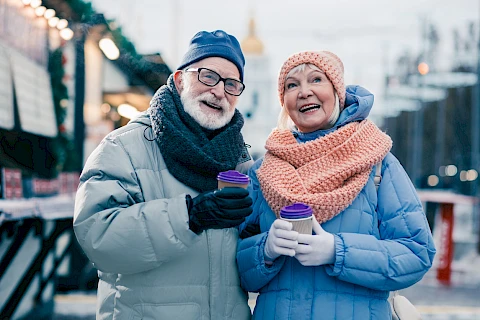
As the temperatures drop, Caregivers need to be mindful of the challenges cold weather poses for seniors. Colder months often bring increased risks, such as falls, hypothermia, and other cold-related illnesses. For caregivers, ensuring the safety and comfort of senior loved ones becomes a top priority. By being prepared and vigilant, caregivers can help seniors enjoy the winter months safely.
Dressing for Warmth
One of the most effective ways to help seniors stay safe during cold weather is to ensure they dress warmly. Wearing layers is key; it traps heat better and allows for easy adjustments if the temperature changes. Start with a moisture-wicking base layer, add a warm middle layer like a sweater, and finish with a waterproof outer layer.
Thermal wear, such as insulated jackets and fleece-lined pants, can provide added warmth. Accessories like hats, scarves, and gloves are needed to prevent body heat loss. When it comes to footwear, selecting non-slip, waterproof boots can significantly reduce the risk of slipping on icy surfaces. Look for shoes with sturdy soles to provide extra grip.
Fall Prevention Strategies
Icy sidewalks and driveways can pose serious fall risks. To maintain balance, Caregivers need to encourage seniors to take small steps and walk slowly. It's also wise to use handrails whenever available. Mobility aids, such as canes or walkers, can provide extra support. Make sure these aids are properly fitted and have non-slip tips. Keep pathways clear of snow and ice by using de-icing solutions or sand. These simple measures can help create safer walkways.
Maintaining a Warm Home Environment
Keeping the home environment warm is critical for the well-being of seniors. Aim for an indoor temperature of at least 68°F (20°C). Regular maintenance of the heating system is necessary to ensure it works efficiently. Schedule check-ups before the winter season start to avoid any unexpected breakdowns. Insulating doors and windows can help keep the cold out. Simple steps like using draft stoppers and heavy curtains can make a significant difference. By maintaining a comfortably warm home, you help prevent hypothermia and other cold-related issues.
Recognizing Cold-Related Illnesses
Seniors are more susceptible to cold-related illnesses. Hypothermia and frostbite are common concerns during the winter months. You need to recognize the symptoms early to avoid serious complications. Look for signs of shivering, confusion, slurred speech, and exhaustion, which could indicate hypothermia. Frostbite symptoms include numbness and pale or waxy skin, usually affecting fingers, toes, ears, and the nose. If you notice any of these signs, seek medical attention immediately.
Help Seniors Stay Safe and Warm
Winter can be a wonderful time of year, but it also demands extra attention to safety, especially for seniors. By keeping these key safety tips in mind, you can help ensure a comfortable and safe winter experience for your loved ones. When it comes to prioritizing senior safety during the colder months, every precaution counts. If you need personalized care solutions or further assistance, don't hesitate to contact Senior Helpers Lake Minnetonka. We proudly serve Minneapolis, Osseo, Excelsior, and Chaska, helping seniors easily navigate the winter weather.